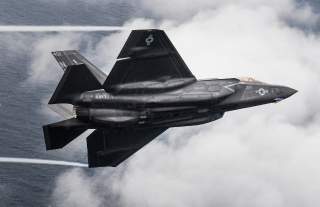Defense Disaster: Russia and China are Crushing the U.S. Military in War Games
How does Washington fix it?
The U.S. military keeps getting its butt kicked in war games, one analyst told Breaking Defense reporter Sydney Freedberg, Jr.
It would cost $24 billion a year to fix the worst problems, the same analyst said.
"In our games, when we fight Russia and China, blue gets its ass handed to it," David Ochmanek, an analyst for the California think tank RAND, said as part of a March 7, 2019 panel discussion at the Washington, D.C.-based Center for a New American Security.
"It turns out U.S. superweapons have a little too much Achilles in their heels," Freedberg quipped.
According to Ochmanek, American bases are vulnerable to attack by long-range missiles. So are large warships sailing the open seas. "Things that rely on sophisticated base infrastructure like runways and fuel tanks are going to have a hard time," Ochmanek said. "Things that sail on the surface of the sea are going to have a hard time."
American forces' over-reliance on large, vulnerable installations and big ships renders moot the high-tech qualities of the stealth aircraft that fly from the bases and the ships, said Robert Work, a former deputy defense secretary who also sat on the CNAS panel.
"In every case I know of, the F-35 rules the sky when it’s in the sky, but it gets killed on the ground in large numbers," Work said, according to Freedberg.
The increasing vulnerability of U.S. forces to missile strikes helps to explain why the U.S. Navy has proposed to decommission one aircraft carrier decades earlier than it previously had planned, Freedberg explained.
Of course, it's possible the Navy's proposal to mothball USS Harry S. Truman is a ploy to extract extra funding from Congress.
Still, military planners aren't wrong to reconsider traditional American methods of projecting power. Ochmanek estimated it would cost $24 billion a year for five years to transform the U.S. military for high-tech war with Russia and China.
"So what does that $24 billion buy?" Freedberg asked.
To start with, missiles. Lots and lots of missiles. The U.S. and its allies notoriously keep underestimating how many smart weapons they’ll need for a shooting war, then start to run out against enemies as weak as the Serbs or Libyans. Against a Russia or China, which can match not only our technology but our mass, you run out of munitions fast.
Specifically, you want lots of long-range offensive missiles. Ochmanek mentioned Army artillery brigades, which use MLRS missile launchers, and the Air Force’s JAGM-ER smart bomb, while Work touted the Navy’s LRASM ship-killer.
You also want lots of defensive missiles to shoot down the enemy‘s offensive missiles, aircraft, and drones. One short-term fix there is the Army’s new Maneuver Short-Range Air Defense batteries, Stinger missiles mounted on eight-by-eight Stryker armored vehicles.
In the longer term, lasers, railguns and high-powered microwaves could shoot down incoming missiles much less expensively.
The military also should fortify its command-and-control networks. "That includes everything from jam-proof datalinks to electronic warfare gear on combat aircraft and warships," Freedberg explained.
"The services are fond of cutting corners on electronics to get as many planes in the air and hulls in the water as possible, Ochmanek said, but a multi-billion dollar ship that dies for lack of a million-dollar decoy is a lousy return on investment."
Work said the Pentagon could free up the cash for these reforms by dismantling big, vulnerable forces. Cutting Truman, for example, "seems right to me," Work said. He also claimed the U.S. Army has more infantry and tank brigades than its missile-defense forces can protect.
If the Defense Department could free up $24 billion, it should give it to the military branch that has the best proposals for achieving certain results in wartime, Work said.
"Sink 350 Chinese navy and coast guard vessels in the first 72 hours of a war, or destroy 2,400 Russian armored vehicles," are two possible goals, Freedberg reported.
David Axe serves as Defense Editor of the National Interest. He is the author of the graphic novels War Fix, War Is Boring and Machete Squad.

